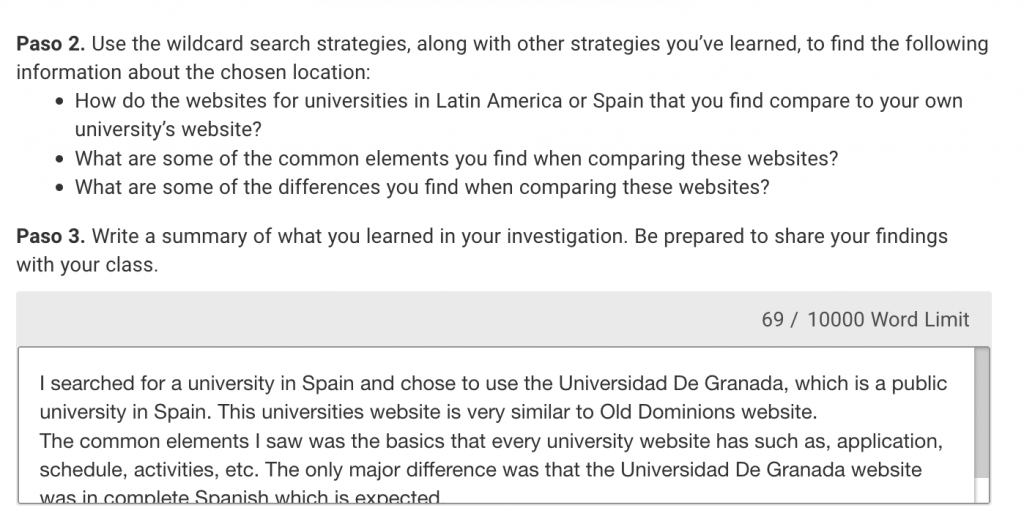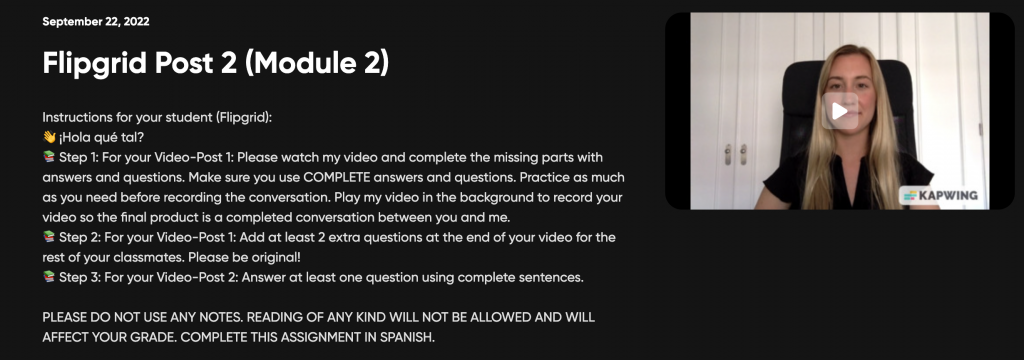Interpretive, Interpersonal, and Presentational Modes of Communication
Exploring Culture
During each chapter, I completed an assignment that consisted of researching about a Spanish-speaking country which is called Exploración cultural. During this assignment, I would explore the culture of the country of my choice. Each chapter had a different set of questions to research about. Some discussion boards also consisted of exploring other Spanish-speaking cultures.
Both of these types of assignments help me be more understanding and open to different Spanish-speaking cultures. It also showed me that although cultures are different, they’re all very similar. We all have different beliefs and practices and that is what’s important and similar between cultures. A lot of personal misconceptions were proven wrong while completing these assignments. Growing up I use to think that different cultures are not something that I would be open to learning about or could care to learn about. Now It is something that interests me, as well as plays a big role in why I’m such an open and understanding person. I am always willing to learn about other cultures so that I can understand other people better and interact with them better.


Engaging in Communities
Engaging in your immediate community and the global community is very important because doing so will give you the experience necessary to further understand other people in your community as well as other communities.
My goal is to get more involved with my immediate community and keep growing until I get involved with the global community.
Interpersonal Communication
During this course, interpersonal communication was used through flipgrid which is a software that supports online asynchronous classes by giving us a platform that allows us to share thoughts and have conversations with other classmates. We were assigned a flipgrid discussion per unit, this was described as a discussion or conversation.
Throughout the semester I can see the class collectively getting better at speaking Spanish compared to the very first flipgrid, myself included. This assignment is a very important aspect of this class and is truly the only way we can have face-to-face conversations with other classmates and the professor. The most difficult part would be stepping out of my comfort zone and recording myself for everyone else to see and hear. I believe the big learning part about these types of assignments is pronunciation so that others understand what is being said, comfort within yourself to record, etc.
*Flipgird post 1 vs post 4 inserted here* Unable to download flipgrid videos for evidence

Presentational Speaking
Many different assignments in this Spanish class consisted of us speaking, discussions on flipgrid, assignments in LingroLearning, and oral exams.
These types of assignments need knowledge and confidence to excel. Public speaking with anything, not just Spanish takes confidence to do so. Specifically for Spanish public speaking, you need knowledge of the language. Things that helped me excel in the LingroLearning assignments and flipgrid discussions were being able to rehearse what I needed to say. The oral exams on the other hand were a lot more difficult for me is that I had no knowledge of what I’d be asked. This is where actually knowing Spanish will help you excel in the exams because you will know how to respond without using notes. During the other assignments, I had access to notes and was able to rehearse what I needed to say which made me more confident. Something I would change is taking more time to actually take in the information so I can excel without using any notes.
Presentational Writing
In English, give a very brief 2-3-line description of the presentational communication of compositions, pamphlets, blogs, flyers, stories, articles, and any other written presentation activities you completed this semester inside or outside of class for or related to your Spanish learning. Include a copy of a written presentational activity you produced. (See Modes of Communication link for description and examples).
Then, in a paragraph, write a reflection that includes each of the activities you described above in which you explain how you have grown with each assignment or activity. What became easier and what was difficult? How did you overcome the difficulties? What did you excel at and why? How could you do better next time?
Interpretive Listening
In English, give a very brief 2-3-line description of interpretive listening activities you completed this semester for or related to your Spanish learning. (See Modes of Communication link for description and examples).
Then, write a short reflection paragraph that includes the different things you listened to/heard this semester inside and outside of class or in the Language Learning Center or its website. Find a recording and add to this section; be sure to cite it. What was unclear or challenging for you? How did you overcome this difficulty? What did you find most interesting or compelling? What was your takeaway from the listening experience? How have you grown with each activity?
Interpretive Reading
In English, give a very brief 2-3 line description of interpretive communication activities you read in and out of class this semester, such as articles, stories, websites like the Language Learning Center, etc. that you completed for or related to your Spanish learning. Include a copy of one of these activities; remember to cite it. (See Modes of Communication link for description and examples).
Then, write a short reflection paragraph that includes the activities you described above. What was unclear or challenging for you? How did you overcome this difficulty? What did you find most interesting or compelling? What was your takeaway from the reading? How have you grown with each assignment?
When you have finished adding content to this page, delete all the instructions except the link to the Modes of Communication.
When you have finished adding content to this page, delete all the instructions except the link to the Modes of Communication.